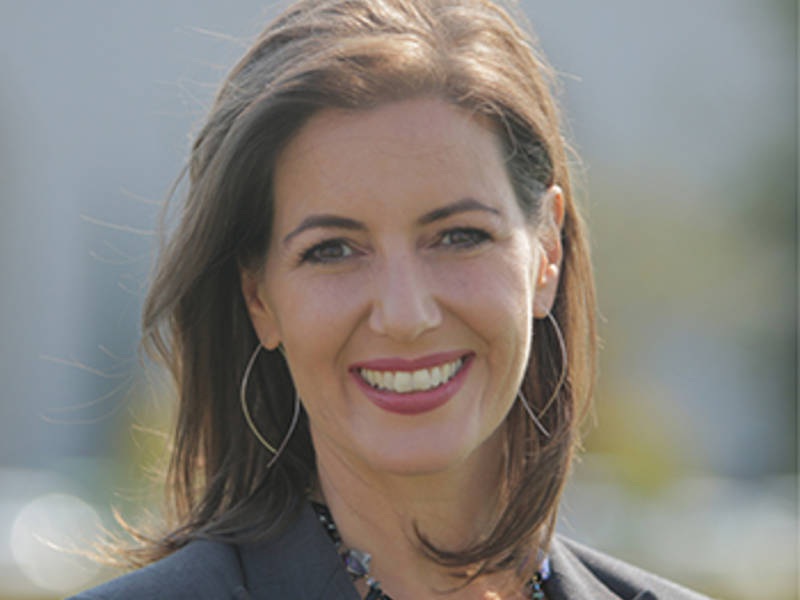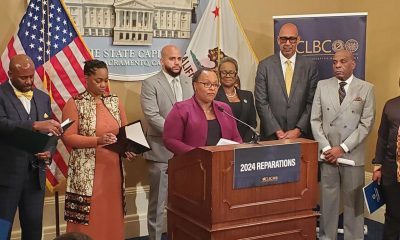Community
Oakland Will Pilot Guaranteed Income Program
“One of my hopes in testing out a guaranteed income is that other cities would follow suit, and I’m thrilled that Oakland is among the first. I applaud Mayor Schaaf’s leadership and am looking forward to working with her to move from pilot to policy,” said former Stockton Mayor and Founder of Mayors for a Guaranteed Income, Michael Tubbs. “By focusing on BIPOC residents, the Oakland Resilient Families program will provide critical financial support to those hardest hit by systemic inequities, including the pandemic’s disproportionate toll on communities of color.”

In partnership with Family Independent Initiative and Mayors for a Guaranteed Income, Oakland Resilient Families will be among the nation’s largest efforts to determine the effectiveness of monthly unconditional payments to residents to help overcome economic instability
Oakland will host one of the largest guaranteed income pilot projects in the country to give 600 BIPOC families with low-incomes an unconditional $500 per month for at least 18 months.
“Oakland Resilient Families” is a collaboration between the Oakland-based community organization Family Independence Initiative and the national Mayors for a Guaranteed Income. The project will support 600 Oakland families while building momentum for strategies to eliminate racial disparities in economic stability, mobility, and assets through a guaranteed income.
“The poverty we all witness today is not a personal failure, it is a systems failure,” said Oakland Mayor Libby Schaaf. “Guaranteed income is one of the most promising tools for systems change, racial equity, and economic mobility we’ve seen in decades. I’m proud to work with such committed local partners to build a new system that can help undo centuries of economic and racial injustice and point us all toward a more just society.”
The Oakland Resilient Families partnership is excited to announce the framework design for community feedback, with the goal of starting payments this spring and summer.
Key Points:
- Who is this for? Black, Indigenous, and People of Color (BIPOC) (i.e. groups with the greatest wealth disparities per the Oakland Equity Index) with low incomes and at least 1 child under 18, regardless of documentation status. The term “family” is defined broadly to recognize that families come in all shapes and sizes.
- How is “low-income” defined? At or below 50% of Area Median Income (about $59,000 per year for a family of 3), however half of the spots are reserved for very-lo- income families earning below 138% of the Federal Poverty Level (about $30,000 per year for a family of 3).
- How are families chosen and how will they apply? Later this spring and summer, and after considerable community outreach efforts that begin with this week’s announcement, a multilingual online form will be released where families can answer a few questions to screen for eligibility. After that families are randomly selected to receive the cash payments.
- How can the money be used? In any way families want. Families will receive $500 per month for 18 months, unconditionally, to use however they choose. They have the option of participating in periodic surveys and interviews, but are not required to.
- When will this start? The goal is to begin payments to families this spring after incorporating more community feedback and to have the entire program up and running this summer.
Oakland Resilient Families began with a pledge to bring a guaranteed income program to Oakland when Mayor Libby Schaaf joined Mayors for a Guaranteed Income as a founding mayor in 2020. Mayors for a Guaranteed Income (MGI) grew out of the groundbreaking Stockton Economic Empowerment Demonstration (SEED) led by former Mayor Michael Tubbs.
MGI now convenes in dozens of cities across the country to support guaranteed income pilots. Oakland Resilient Families is not a city-run program but the partnership with MGI connects the initiative with dozens of other cities for research collaboration and technical assistance.
In preliminary results released earlier this month, gathered from Feb. 2019 to Feb. 2020, SEED found recipients obtained full-time employment at more than twice the rate of non-recipients. Recipients were less anxious and depressed, both over time and compared to the control group. They also saw statistically significant improvements in emotional health, fatigue levels and overall well-being.
“One of my hopes in testing out a guaranteed income is that other cities would follow suit, and I’m thrilled that Oakland is among the first. I applaud Mayor Schaaf’s leadership and am looking forward to working with her to move from pilot to policy,” said former Stockton Mayor and Founder of Mayors for a Guaranteed Income, Michael Tubbs. “By focusing on BIPOC residents, the Oakland Resilient Families program will provide critical financial support to those hardest hit by systemic inequities, including the pandemic’s disproportionate toll on communities of color.”
The project team includes Oakland-based national non-profit Family Independence Initiative (FII) as the implementing partner and Oakland Thrives provides backbone support and coordination. FII was founded in Oakland 20 years ago with the belief that that society has underestimated the potential and resourcefulness of communities with limited income to improve their own financial and general well-being. FII uses technology to facilitate families in accessing cash and supporting one another in achieving mobility — working with over 200,000 households nationally with $140 million in unrestricted cash transfers since the pandemic reached the U.S.
“When people say ‘How do we solve poverty in America?’ The reality is that families solve poverty everyday,” said Jesus Gerena, CEO, Family Independence Initiative. “FII is proud to deepen our partnership with Oakland families in our hometown through Oakland Resilient Families.”
In partnership with local community organizations and government leaders, Oakland Resilient Families will continue incorporating community feedback on design and implementation. Opportunities will include multilingual outreach, socially distanced in-person and online presentations, tabling at community events, and focus groups with eligible families compensated for their time.
“As a Council representative for East Oakland, an area that faces many challenges including economic disparities and historic underinvestment, I am excited to see this innovative program come to Oakland,” said Councilmember Loren Taylor. “While traditional outreach often comes up short – failing to effectively engage those with the most need, I am ready to help lead a more effective community engagement process to bring hope and relief to those who have not had the chance to benefit from the same prosperity and opportunities in Oakland.”
Oakland Resilient Families is 100% funded through philanthropic donations anchored by an investment from Blue Meridian Partners’ Place Matters portfolio, which aims to improve economic and social mobility in communities across the US through investments both in place-based partnerships and in supports to catalyze their success.
For more information visit www.oaklandresilientfamilies.org
Alameda County
DA Pamela Price Stands by Mom Who Lost Son to Gun Violence in Oakland
Last week, The Post published a photo showing Alameda County District Attorney Pamela Price with Carol Jones, whose son, Patrick DeMarco Scott, was gunned down by an unknown assailant in 2018.

Publisher’s note: Last week, The Post published a photo showing Alameda County District Attorney Pamela Price with Carol Jones, whose son, Patrick DeMarco Scott, was gunned down by an unknown assailant in 2018. The photo was too small for readers to see where the women were and what they were doing. Here we show Price and Jones as they complete a walk in memory of Scott. For more information and to contribute, please contact Carol Jones at 510-978-5517 at morefoundation.help@gmail.com. Courtesy photo.
City Government
Vallejo Welcomes Interim City Manager Beverli Marshall
At Tuesday night’s Council meeting, the Vallejo City Council appointed Beverli Marshall as the interim city manager. Her tenure in the City Manager’s Office began today, Wednesday, April 10. Mayor Robert McConnell praised Marshall’s extensive background, noting her “wide breadth of experience in many areas that will assist the City and its citizens in understanding the complexity of the many issues that must be solved” in Vallejo.

Special to The Post
At Tuesday night’s Council meeting, the Vallejo City Council appointed Beverli Marshall as the interim city manager. Her tenure in the City Manager’s Office began today, Wednesday, April 10.
Mayor Robert McConnell praised Marshall’s extensive background, noting her “wide breadth of experience in many areas that will assist the City and its citizens in understanding the complexity of the many issues that must be solved” in Vallejo.
Current City Manager Michael Malone, whose official departure is slated for April 18, expressed his well wishes. “I wish the City of Vallejo and Interim City Manager Marshall all the best in moving forward on the progress we’ve made to improve service to residents.” Malone expressed his hope that the staff and Council will work closely with ICM Marshall to “ensure success and prosperity for the City.”
According to the Vallejo Sun, Malone stepped into the role of interim city manager in 2021 and became permanent in 2022. Previously, Malone served as the city’s water director and decided to retire from city service e at the end of his contract which is April 18.
“I hope the excellent work of City staff will continue for years to come in Vallejo,” he said. “However, recent developments have led me to this decision to announce my retirement.”
When Malone was appointed, Vallejo was awash in scandals involving the housing division and the police department. A third of the city’s jobs went unfilled during most of his tenure, making for a rocky road for getting things done, the Vallejo Sun reported.
At last night’s council meeting, McConnell explained the selection process, highlighting the council’s confidence in achieving positive outcomes through a collaborative effort, and said this afternoon, “The Council is confident that by working closely together, positive results will be obtained.”
While the search for a permanent city manager is ongoing, an announcement is expected in the coming months.
On behalf of the City Council, Mayor McConnell extended gratitude to the staff, citizen groups, and recruitment firm.
“The Council wishes to thank the staff, the citizens’ group, and the recruitment firm for their diligent work and careful consideration for the selection of what is possibly the most important decision a Council can make on behalf of the betterment of our City,” McConnell said.
The Vallejo Sun contributed to this report.
City Government
Vallejo Community Members Appeal Major Use Permit for ELITE Charter School Expansion
Vallejo community members, former Solano County judge Paul Beeman and his wife Donna Beeman, filed an appeal against the approval of the Major Use Permit for the expansion of ELITE Public Schools into downtown less than two weeks after the Planning Commission approved the permit with a 6-1 vote.

By Magaly Muñoz
Vallejo community members, former Solano County judge Paul Beeman and his wife Donna Beeman, filed an appeal against the approval of the Major Use Permit for the expansion of ELITE Public Schools into downtown less than two weeks after the Planning Commission approved the permit with a 6-1 vote.
ELITE Charter School has been attempting to move into the downtown Vallejo area at 241-255 Georgia Street for two years, aiming to increase its capacity for high school students. However, a small group of residents and business owners, most notably the Beeman’s, have opposed the move.
The former county judge and his wife’s appeal alleges inaccuracies in the city’s staff report and presentation, and concerns about the project’s exemption from the California Environmental Quality Act (CEQA).
The Beeman’s stress that their opposition is not based on the charter or the people associated with it but solely on land use issues and potential impact on their business, which is located directly next to the proposed school location.
The couple have been vocal in their opposition to the expansion charter school with records of this going back to spring of last year, stating that the arrival of the 400 students in downtown will create a nuisance to those in the area.
During the Planning Commission meeting, Mr. Beeman asked Commissioner Cohen-Thompson to recuse herself from voting citing a possible conflict of interest because she had voted to approve the school’s expansion as trustee of the Solano County Board of Education. However, Cohen-Thompson and City Attorney Laura Zagaroli maintained that her positions did not create a conflict.
“I feel 100% that the attorney’s opinion is wrong,” Beeman told the Post.
He believes that Cohen-Thompson has a vested interest in upholding her earlier vote as a trustee and is advocating for people to ratify her opinion.
Cohen-Thompson declined to comment on the Post’s story and Zagaroli did not respond for comment.
The Beeman’s further argue that the school’s presence in the commercial district could deter future businesses, including those who sell alcohol due to proximity to schools.
According to Alcohol Beverage Control (ABC), the department can deny any retail license located within 600 feet of a school. Only one alcohol selling business is located within that range, which is Bambino’s Italian restaurant at 300 feet from the proposed location.
The project’s proponents argue that the school would not affect current or future liquor-selling establishments as long as they follow the ABC agency’s guidelines.
The Beeman’s also referenced Vallejo’s General Plan 2040, stating that the proposed expansion does not align with the plan’s revitalization efforts or arts and entertainment use. They argue that such a development should focus on vacant and underutilized areas, in accordance with the plan.
The proposed location, 241 Georgia Street aligns with this plan and is a two minute walk from the Vallejo Transit Center.
The General Plan emphasizes activating the downtown with, “Workers, residents, and students activate the downtown area seven days a week, providing a critical mass to support a ‘cafe culture’ and technology access, sparking innovation and entrepreneurship.”
City staff recommended exempting the project from CEQA, citing negligible impacts. However, Beeman raised concerns about increased foot traffic potentially exacerbating existing issues like theft and the lack of police presence downtown. He shared that he’s had a few encounters with kids running around his office building and disturbing his work.
Tara Beasley-Stansberry, a Planning Commissioner and owner of Noonie’s Place, told the Post that the arrival of students in downtown can mean not only opportunities for surrounding businesses, but can allow for students to find their first jobs and continue to give back to the community in revitalization efforts.
Beasley-Stansberry had advocated for the students at the March Commission meeting, sharing disappointment in the way that community members spoke negatively of the teens.
“To characterize these children as criminals before they’ve even graduated from high school, that’s when I had to really take a look and I was kind of lost as to where we were as a city and as a community to where I couldn’t understand how we were viewing these children,” Beasley-Stansberry told the Post.
She added that the commissioners who voted yes on the project location have to do what is right for the community and that the city’s purpose is not all about generating businesses.
ELITE CEO Dr. Ramona Bishop, told the Post that they have worked with the city and responded to all questions and concerns from the appropriate departments. She claimed ELITE has one of the fastest growing schools in the county with mostly Vallejo residents.
“We have motivated college-bound high school students who deserve this downtown location designed just for them,” Bishop said. “We look forward to occupying our new [location] in the fall of 2024 and ask the Vallejo City Council to uphold their Planning Commission vote without delay.”
The Vallejo City Council will make the final decision about the project location and Major Use Permit on April 23.
-

 Activism4 weeks ago
Activism4 weeks agoOakland Post: Week of March 27 – April 2, 2024
-

 #NNPA BlackPress4 weeks ago
#NNPA BlackPress4 weeks agoCOMMENTARY: D.C. Crime Bill Fails to Address Root Causes of Violence and Incarceration
-

 #NNPA BlackPress4 weeks ago
#NNPA BlackPress4 weeks agoFrom Raids to Revelations: The Dark Turn in Sean ‘Diddy’ Combs’ Saga
-

 #NNPA BlackPress4 weeks ago
#NNPA BlackPress4 weeks agoMayor, City Council President React to May 31 Closing of Birmingham-Southern College
-

 #NNPA BlackPress4 weeks ago
#NNPA BlackPress4 weeks agoBaltimore Key Bridge Catastrophe: A City’s Heartbreak and a Nation’s Alarm
-

 #NNPA BlackPress4 weeks ago
#NNPA BlackPress4 weeks agoBaltimore’s Key Bridge Struck by Ship, Collapses into Water
-

 #NNPA BlackPress4 weeks ago
#NNPA BlackPress4 weeks agoBeloved Actor and Activist Louis Cameron Gossett Jr. Dies at 87
-

 Community1 week ago
Community1 week agoFinancial Assistance Bill for Descendants of Enslaved Persons to Help Them Purchase, Own, or Maintain a Home




















































